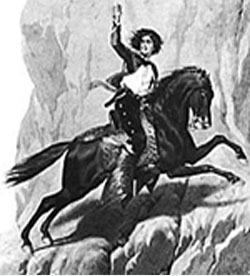

In order to understand the significance of Joaquín Murrieta one must examine two important issues that surround him: social banditry and ethclass consciousness.
A definition of Social Banditry is required in order to draw a comparison with Murrieta, as such. A Social Bandit is someone who is considered an outlaw by the legitimate law, while remaining a hero to the populace. He respresented the oppressed foreigner who suffered discrimination under the law. He came to California to lead an honest life, he was wronged by a people whom he admired. To revenge himself he took to an outlaw life and robbed and killed the hated "gringo". Many of his fellow Chicanos did not approve of Murrieta'a actions, but they were sympathetic to his cause because he dared to fight back and lead his people in a crusade against the "gringo".
This concept of social banditry is well known and seen in other historical figures such as Robin Hood, in which the bandit or villian defends the oppressed from the injustices of the ruling class.
The issue of ethclass consciousness is also a necessary factor in understanding the rise of Joaquín Murrieta. Ethclass consciousness is the identification, or awareness of one's own ethnicity and social status and how that plays a role in the way society perceives them. Ethclass consciousness was prevelant among the Spanish-speaking people of California during this era. The social forces in the state during the gold rush period were highly instrumental in creating this consciousness. There was a strong Anglo racism against the Spanish-speaking. This racism was evident in terms of how immigrants were treated in general as well as in legislation that was passed specifically to target them. One example of this was the Foreign Miner's Tax.